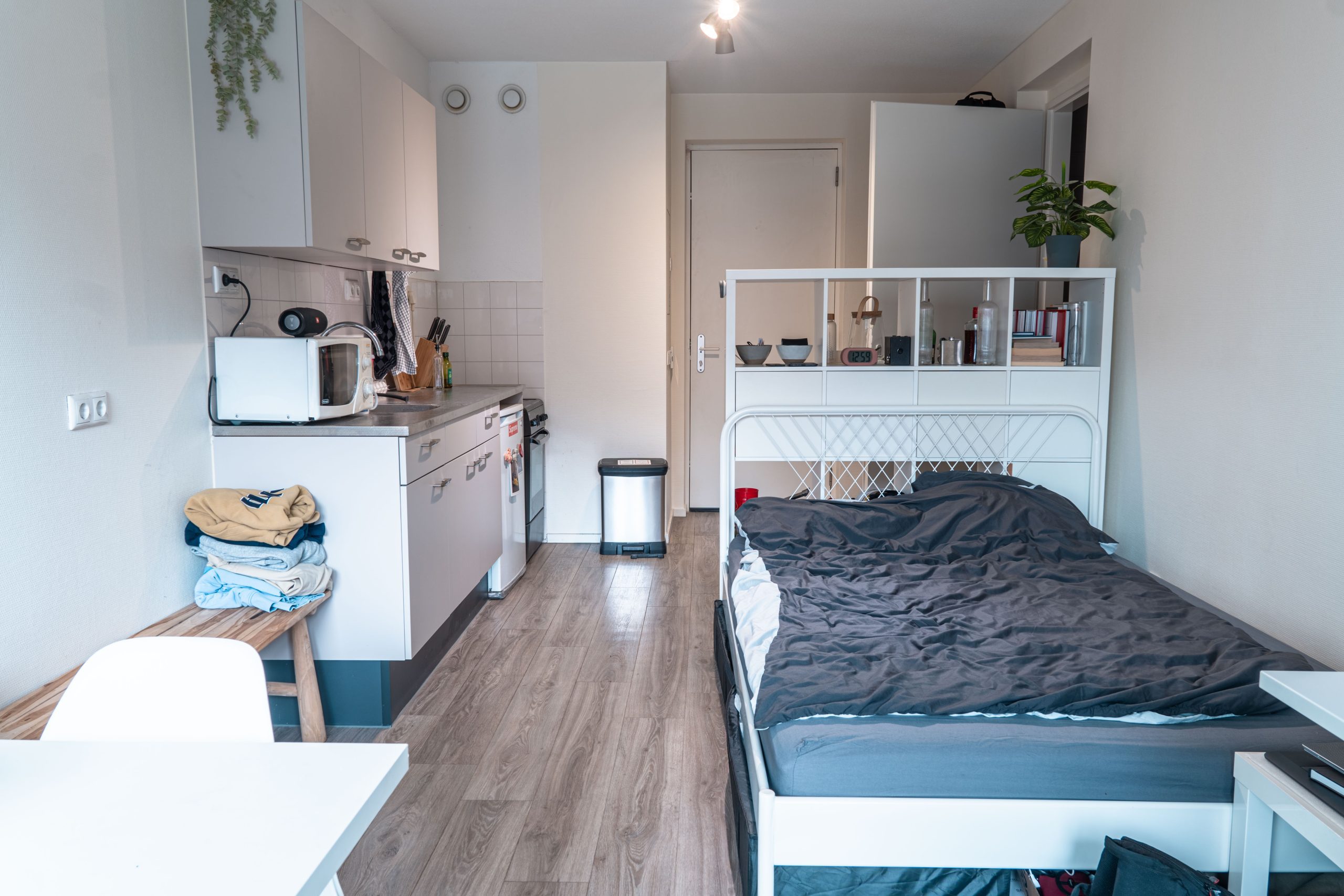In many student cities it will get more difficult to find a home, predict the authors of the National Student Housing Monitor. And yet, they see encouraging signs.
(Photo: Thijs van Reeuwijk)
In eight years’ time, there will still be a shortage of between 26 and 42 thousand student homes, estimate the authors of the National Student Housing Monitor, which was published last Thursday.
In a way, that’s good news: they previously predicted a shortage of 40 to 57 thousand student homes. Since then, all kinds of building plans have been made to somewhat bridge the gap. The ‘National Student Housing Action Plan’ is ultimately to yield 60 thousand extra rooms and studios.
Might be higher
But the prognoses remain uncertain. “If the demand for student housing of vocational students is also factored in, the shortage might be higher”, says the monitor.
In 5 out of 20 cities vocational students represent more than 20 percent of the housing need among students. In Delft, Maastricht and Wageningen, with 3 percent or less, vocational students represent only a small part of the total student housing need.
Furthermore, the researchers haven’t anticipated a drastic decrease of the number of foreign students. Should the government get the green light for its plans to strongly limit internationalisation, the demand for housing will of course go down.
- Finding student housing in Delft? It’s becoming increasingly difficult. Keep up to date with all developments in our dossier.
Basic grant
The authors also don’t know the exact effect of the new basic student grant: will students be more eager to leave home or not? Ever since the basic grant was reintroduced, more students have started living independently. Jolan de Bie, director of Kences (the umbrella organisation for student housing) thinks this is good news. According to her, it’s “important for the wellbeing and socio-emotional development of students”.
This is one of the reasons why the housing shortage is a problem. In the 2031/’32 academic year, an estimated 350 thousand students will be living on their own, with thousands of other students still living with their parents but wanting to move out.
‘Relocating study programmes can be part of the solution’
In some cities, the housing shortage is more severe than elsewhere. The rental rates are very high in Amsterdam and Utrecht, where students are struggling to find accommodations. Delft, Eindhoven, Leiden, Nijmegen, Rotterdam, ‘s-Hertogenbosch and Zwolle also have relatively very tight housing markets for students. Click here for an overview (in Dutch) of the current pressure on the student housing market per city.
Come here!
Cities with some room on the housing market are taking advantage of the situation by promoting themselves as student cities, several media outlets reported (in Dutch) last week. In Assen, for instance, about 85 students are enrolled in a study programme and the city would love to increase that number.
Almere is partly targeting students who are studying in Amsterdam, where housing is very expensive, but also intends to expand its own educational offerings. The idea is for these to include university programmes as well. According to Ardin Mourik, appointed as ‘student housing director’ by the previous cabinet, relocating study programmes can be part of the solution, he said to NOS.
Landlady
Politicians are trying all kinds of things to combat the housing shortage, for instance by encouraging the return of the student lodgings. Rules will be introduced that should make it easier to rent out an empty room to a student.
On the housing market, there is the problem that the rent allowance often makes it more attractive to build a studio than student housing with room rental. There are calls (by students and landlords) to modify the rent allowance, so students renting a room would also be eligible. This would encourage corporations to build these kinds of homes more often.
This modification of the rent allowance keeps failing to get traction with the politicians in The Hague. It seems to be even less of an option to make the construction of homes a matter of national importance and switch to non-profit construction.
Rental rates
Due to the housing shortage, rental rates are skyrocketing, particularly in Amsterdam. According to Kamernet, rooms cost an average of a thousand euros per month there. Most accommodations offered on Kamernet are private ones. Haarlem, Utrecht and Rotterdam are also expensive.
The average rent in Delft is a lot lower in this respect. According to the National Student Union (LSVb), you will pay an average of 500 euros for living space in 2024.
The authors of the monitor conducted their own survey, which mentions other rental rates. In this survey, which may include more student housing, all-in rental rates are reported to be highest in Rotterdam: 640 euros per month, versus 630 euros in Amsterdam. Tilburg is reported to have the most expensive multi-room homes in the Netherlands: 875 euros per month.
HOP, Bas Belleman
Translation: Taalcentrum-VU
Do you have a question or comment about this article?
redactie@hogeronderwijspersbureau.nl


Comments are closed.